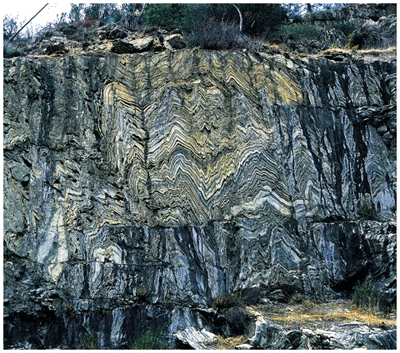Remote Ready Biology Learning Activities has 50 remote-ready activities, which work for either your classroom or remote teaching.
Serendip is an independent site partnering with faculty at multiple colleges and universities around the world. Happy exploring!
"Making Change" from
Caterpillars and Butterflies to Rocks
...if you know how to read a rock,
then what you'll see is this:
What it was. Where it's been. What fires it's seen.
So what I have to say is this:
if you're looking for a metaphor, and the topic is [learning]...
forget butterflies.
Think rocks.
|
|
 Shist |  Philosopher's Stone |
But wait! There's one meaning of "making change"
--turns out it's the "foundational" meaning--
that we haven't yet evoked in this Institute:

"Change" derives from a Old French/Portugese/Spanish/Latin word cambi-um meaning exchange, or barter (=bend, turn, turn back). The "first" meaning of "to change" is "to substitute," and the seventh is money of a lower denomination given in exchange for a larger coin, or the balance that remains over and is returned when anything is paid for by a piece of money greater than its price. (Or what Mary Cornish, in her poem "Numbers", calls "the gift of the odd remainder.")
Can you do anything useful with "what's left over"?
Sometimes (as on both Monday and Tuesday afternoons,
when Anne and Wil found themselves trying to "fill out" the final hour),
we can try to pad it/stretch 'em....
and sometimes there's something "rich" to be found in the
"leftovers"....
For instance, there's the matter of trying to clear up a little confusion....
Julie: I am very confused about the notion that we do not have choice....Are you as confused as I am?
Randal : It would appear to me that the behavior of the ant results from initially providing it only a few set of instructions then allowing it to behave in any manner it ... is permitted.
TERESA: nothing about the ant appears to be of its own volition. So, what is its choice?
Cleat : Langstons Ant doesnt have a choice.
Judith : Do you really think it has a real choice?
Julie: Langston's ant ... continues to move and ... to "obey" the commands.
Margaret : the ant "struggled", unable to get out.
Connie: It seems that the ant has got coping skills to adjust to what he has to deal with to carry out his task at hand.
Antoinette: Langton's Ant is a computer program with a set of four simple rules
Saroja: The ant moves according to the choices it is given.
Cynthia: CHANGE MAY BE IMPOSED...
Connie: I provide a variety of choices for my students ....
Julie : I enjoy watching students make choices in school. You can... almost see the wheels turning in their mind....
CYNTHIA: choices are willful and often deliberate.
Judith: we all have choices
Cleat: we create an atmosphere that overflows with choices for our students
Teresa: humans must be set apart from other beings in being able to choose
Randal : certain demonstrations of behavior are... actually deterministic.... we see this as detailed by the knee jerk reaction. ... Is educating others really that simple?... I think not. There are countless variables ...crucial to the learning process.
Margaret: I have had to make the choice not to be discouraged, not to give up too many times.
More Margaret:It's important that young people feel they have choices.....We have to let children know that it is possible to live with all sorts of visible and invisible scars and life can still be worthwhile. It is all about choosing.
Antoinette: Years ago, I heard a preacher define freedom ...as ... a set of bounderies, (chioces) that allow us safety.
Randal (in conversation): It is not a barrier; it is an opportunity for the ant to interact with its environment. It changes its environment.
What is choice?
Cynthia: A change taking place.
What is choice?
Randal: Acting outside a set of instructions.
What is change?
Anne: A measure of learning.

What is the difference between "change" and "choice"?
Making the choice to be open to be change...? Even to seek it out?
On Friday morning, we ask that each of you perform for all of us what has changed for you in the course of this Institute. Think of this finale as an chance to experiment with "performative assessment": How can you demonstrate what you have been learning and doing? What you will go on to do with it?
But first: some conversation about our changing environment...?
Hey. How 'bout a history of tetonics:
the battle between those who wanted to believe that the earth was static
and those who were looking for evidence of drift....?
Or one about a tsunami?

The New York Times Science Times (8/2/05) described an article this spring in Seismological Research Letters...[which] found references in art and stories of natives of the Pacific Northwest to the Cascadia earthquake of 1700....the events are... memorialized in mythical stories about Thunderbird and Whale....Thunderbird is sometimes drawn down into the sea by Whale, causing great disruption, and sometimes drops Whale on the land, causing it to quake.
Don: got another story for us?
[an error occurred while processing this directive]